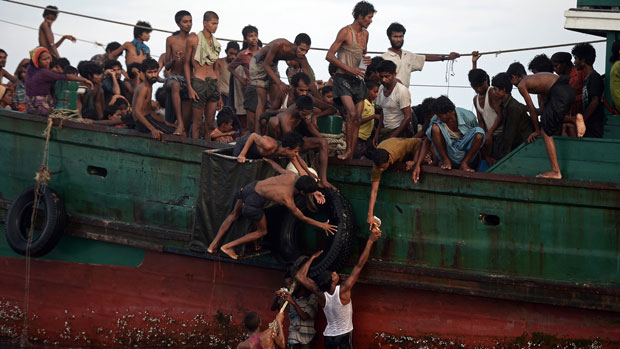The Rohingya boat crisis: why refugees are fleeing Burma
Starving Rohingya migrants have been rebuffed from Malaysia, Indonesia and Thailand

A free daily email with the biggest news stories of the day – and the best features from TheWeek.com
You are now subscribed
Your newsletter sign-up was successful
The Rohingya – widely acknowledged as the world's most persecuted community – have returned to international attention after boats packed with starving migrants were reported stranded at sea. Who are these desperate people, why are they fleeing their home, and what's going to happen next?
Who are the Rohingya?
The Rohingya are a distinct Muslim ethnic group in Burma's Rakhine province, although many also live in neighboring Bangladesh.
The Week
Escape your echo chamber. Get the facts behind the news, plus analysis from multiple perspectives.

Sign up for The Week's Free Newsletters
From our morning news briefing to a weekly Good News Newsletter, get the best of The Week delivered directly to your inbox.
From our morning news briefing to a weekly Good News Newsletter, get the best of The Week delivered directly to your inbox.
Forced to live in apartheid-like conditions, Burma's Rohingya have been effectively stateless since the passing of the country's 1982 citizenship law. In fact the Burmese government refuses to recognise the Rohingya as an ethnic group, instead insisting they are Bengali economic migrants. In Febuary this year it declared that Rohingya "is terminology which has never been included among over 100 national races of Myanmar (Burma)", the New Statesman reports.
What's happening at the moment?
Boats filled with Rohingya refugees and a number of economic migrants from Bangladesh are attempting to escape Burma via the waters of the Malacca Strait and the Andaman Sea. These migrants have been collectively dubbed 'boat people' by the international media.
Why are they fleeing?
A free daily email with the biggest news stories of the day – and the best features from TheWeek.com
After years of persecution in Burma, tensions reached a critical level in 2012 following the gang rape of a Buddhist woman. Violent clashes resulted in the deaths of hundreds of Rohingya and left a further 140,000 homeless; many are now trapped in internal displacement camps. Since the violence erupted, the UN predicts that 100,000 Rohingya have fled Burma by sea. Additionally, the International Organisation for Migration believes there are currently 8,000 Rohingya stranded at sea.
What's attracting the global attention now?
Recently, several boats packed with hundreds of desperate migrants have been caught up in a game of international ping-pong between South East Asian countries including Malaysia, Indonesia and Thailand.
Essentially the Rohingya refugees – joined by a number of Bangladeshi migrants – are being passed between countries that don't want them. The UN has called on nearby Malaysia and Indonesia to respect international law and offer help to those stranded at sea, but South East Asian countries have been using reports of the presence of economic migrants as an excuse to turn the so-called 'boat people' away. On Wednesday the governments of Malaysia and Indonesia said they would no longer turn away migrant boats.
In one incident last week, a boat containing some 300 migrants was left stranded off the coast of Thailand after its engine broke down. Repaired by the Thai navy, the boat continued on its journey towards Malaysia and Indonesia. While the Thai navy and ministry of defence insist that offers of refuge were made to the migrants, other reports claim they were intimidated away from the shore. The International Business Times reports that the boat has vanished after moving on from Thai waters.
How has the global community responded?
The international response has been mixed and confused, with blame and responsibility for action being passed from one group to another.
The response from largely Islamic African nations has been the loudest. On Wednesday, the impoverished West African nation of Gambia offered to resettle all the Rohingya in refugee camps, The Guardian reports. Even Al-Shabaab – the al-Qaeda-affiliated Somali terror group – has called upon the mostly Islamic nations of Indonesia and Malaysia to welcome the fleeing Rohingya and save them from "the savage Buddhists".
According to the Daily Telegraph, the group has also demanded that local Muslims "Mobilise men, money and resources to defend the honour of the persecuted Muslims and repel the savage attacks of the polytheists".
In the western, the US has pledged to help resettle the Rohingya, and criticised neighbouring countries for not doing enough to help. By contrast, Australian prime minister Tony Abbott said his country would do "absolutely nothing" that might encourage people to get on a boat, says The Guardian.
One notable absence is the voice of Burma's opposition leader, Aung San Suu Kyi. The Nobel peace prize has remained largely silent on the Rohingya crisis.